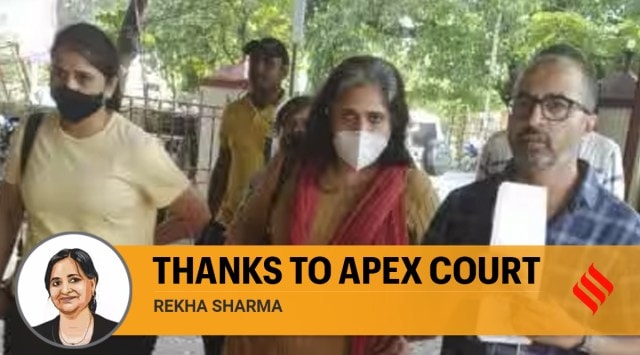Teesta Setalvad bail matter: Supreme Court rescues rule of law indianexpress
21, Jul 2023 | Rekha Sharma
There is an attempt to discredit her by hinting that she was bestowed Padma Shri and became a member of the Planning Commission through her connections. One fails to understand the relevance of the observations to the grant or rejection of bail

The Gujarat HC rejected Setalvad’s bail on the unsustainable plea that since she had neither challenged the FIR nor the chargesheet, it was not permissible for her to say that a prima facie case was not made out.
Making laws is not enough to ensure the dispensation of justice. While the “ruler” tends to tamper with the basic structure of the rule of law, judges should be guided by it and protect and enforce it without fear or favour. They should resist any encroachment on their independence.
Setalvad was arrested on June 25, 2022, a day after the SC dismissed the plea of Zakia Jafri, wife of former Congress MP Ehsan Jafri who was killed in Gujarat riots, against the then Chief Minister and others over allegations of conspiracy during the riots. The SC while dismissing Zakia’s plea also observed that “the proceedings were pursued to keep the pot boiling for ulterior design, and that all those involved in such abuse of process need to be in the dock”. Taking a cue from these observations, Setalvad was arrested the next day for allegedly fabricating evidence against the accused. She had fully cooperated while she was in police custody for seven days for interrogation. The police did not seek further custody, and she was sent to judicial custody. Meanwhile, on September 22, 2022, she was granted interim bail by the SC and continued to remain on interim bail till the Gujarat HC dismissed her regular bail application on July 1, and directed her to surrender immediately. Though she pleaded before the HC for suspension of her surrender by 30 days to enable her to move the SC, it was unmoved.
She had to rush to the SC on the same day. In a late-night sitting, the Court granted her interim protection, and while so doing, one of the members of the three-judge bench, reportedly, observed that “heavens won’t fall if the interim protection is granted”. However, the Gujarat HC rejected Setalvad’s bail on the unsustainable plea that since she had neither challenged the FIR nor the chargesheet, it was not permissible for her to say that a prima facie case was not made out. The SC felt compelled to observe that “if the reasoning of the learned judge is to be accepted, no application for bail can be accepted” and that “the findings are totally perverse”.
A perusal of the HC order reveals that it has virtually copied and pasted the allegations against Setalvad in the FIR and chargesheet. It has based its order rejecting the bail on those allegations, even when the accused has not had the opportunity to counter them. Shockingly, the learned judge in paragraph 11.24 of the judgment observes: “I have seen that a journalist i.e., [the] applicant has started her career as [a] journalist and prima facie it seems that by using victim and witnesses as [a] ladder for her own benefits the present applicant ultimately reached on to Padmashree to become Member of Planning Commission.”
These observations can be said to point to a bias against the accused. There is an attempt to discredit her by hinting that she was bestowed Padma Shri and became a member of the Planning Commission through her connections. This is tantamount to belittling the award and her membership of the Planning Commission. One fails to understand the relevance of the observations to the grant or rejection of bail.
In 1965, the conference of the International Commission of Jurists in Bangkok emphasised the importance of an independent judiciary in a free society. Unfortunately, the Gujarat HC’s order neither upheld its independence against the executive nor faithfully interpreted the law and the fundamental principles that underline it. It failed to protect the Constitution. It failed to protect the rights of the individual. It failed to perform its essential role.
Thank you, Supreme Court, for standing by the individual. Thank you, for standing for the Constitution.










